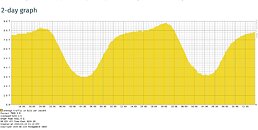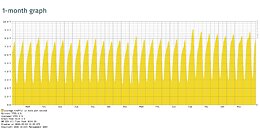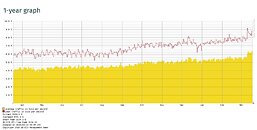- Joined
- Oct 9, 2007
- Messages
- 47,513 (7.48/day)
- Location
- Hyderabad, India
| System Name | RBMK-1000 |
|---|---|
| Processor | AMD Ryzen 7 5700G |
| Motherboard | ASUS ROG Strix B450-E Gaming |
| Cooling | DeepCool Gammax L240 V2 |
| Memory | 2x 8GB G.Skill Sniper X |
| Video Card(s) | Palit GeForce RTX 2080 SUPER GameRock |
| Storage | Western Digital Black NVMe 512GB |
| Display(s) | BenQ 1440p 60 Hz 27-inch |
| Case | Corsair Carbide 100R |
| Audio Device(s) | ASUS SupremeFX S1220A |
| Power Supply | Cooler Master MWE Gold 650W |
| Mouse | ASUS ROG Strix Impact |
| Keyboard | Gamdias Hermes E2 |
| Software | Windows 11 Pro |
DE-CIX, the operator of the world's largest Internet Exchange in Frankfurt am Main, Germany, is taking stock for the first time since the tightening of public measures in the fight against the spread of the COVID-19 virus. DE-CIX has noted a strong change in data traffic and also in Internet user behavior. The average data traffic at the world's largest Internet Exchange in Frankfurt has increased by 10% since last Wednesday. Compared to the previous few weeks, there has also been a significant increase in video conferencing traffic - such as Skype, Teams, and WebEx - of about 50%, and a rising number of VPN users has also been registered. In addition, since Friday last week there has also been an increase of about 25% in online and cloud gaming, and there has also been a significant increase in traffic from the use of social media platforms. Similar results are expected for the other DE-CIX locations.
"Capacities in our own network are regularly expanded on a long-term basis. We always plan for about twelve months in advance. We continue expanding as soon as 63% of the existing capacities are reached. The remaining 37% free capacity is needed to create redundancy and to ensure that we always have enough free capacity for traffic growth. In addition to our network for the Internet Exchange, customers also need to expand capacity in their own network. These expansions are carried out by the customers themselves, according to their own processes and procedures," comments Dr Thomas King, CTO at DE-CIX, on the increasing data traffic.



Customers increase their capacities at the DE-CIX Internet Exchanges worldwide
Due to the increasing and also changing use of the Internet, DE-CIX customers worldwide are increasing their data capacities in order to meet the needs of their end users. Since the beginning of March, a 20 percent increase in the demand for additional capacities has been recorded for all DE-CIX Internet nodes worldwide. "We are seeing the increase in capacities, especially with the major global Internet and content providers. In some cases, the capacities have been more than doubled. Especially in international data hubs such as New York, Madrid, and Frankfurt, the demand for more capacities at the DE-CIX Internet Exchanges is high. Here, too, we are seeing new record levels of data traffic at peak times," says Ivo Ivanov, CEO DE-CIX International, on the current developments.
"In times when people have to practice social distancing and perhaps self-isolate, a direct connection to family, friends, and the company environment via the various private and business applications is essential. The operation of this application layer and the exchange of data must run smoothly. Here we see it as our maxim to guarantee our customers - and thus Internet users worldwide - a trouble-free, secure, and reliable Internet."
DE-CIX Frankfurt set a new world record in data throughput just one week ago. A ne barrier was broken with over 9.1 terabits per second. Never before has so much data been exchanged at an Internet exchange at peak times. It was only in December 2019 that DE-CIX in Frankfurt broke the 8-terabit-per second record and it has increased its data throughput by more than 12 percent in just a few months. Further local records were set in the last few days at the DE-CIX locations in Munich and Madrid.
View at TechPowerUp Main Site
"Capacities in our own network are regularly expanded on a long-term basis. We always plan for about twelve months in advance. We continue expanding as soon as 63% of the existing capacities are reached. The remaining 37% free capacity is needed to create redundancy and to ensure that we always have enough free capacity for traffic growth. In addition to our network for the Internet Exchange, customers also need to expand capacity in their own network. These expansions are carried out by the customers themselves, according to their own processes and procedures," comments Dr Thomas King, CTO at DE-CIX, on the increasing data traffic.



Customers increase their capacities at the DE-CIX Internet Exchanges worldwide
Due to the increasing and also changing use of the Internet, DE-CIX customers worldwide are increasing their data capacities in order to meet the needs of their end users. Since the beginning of March, a 20 percent increase in the demand for additional capacities has been recorded for all DE-CIX Internet nodes worldwide. "We are seeing the increase in capacities, especially with the major global Internet and content providers. In some cases, the capacities have been more than doubled. Especially in international data hubs such as New York, Madrid, and Frankfurt, the demand for more capacities at the DE-CIX Internet Exchanges is high. Here, too, we are seeing new record levels of data traffic at peak times," says Ivo Ivanov, CEO DE-CIX International, on the current developments.
"In times when people have to practice social distancing and perhaps self-isolate, a direct connection to family, friends, and the company environment via the various private and business applications is essential. The operation of this application layer and the exchange of data must run smoothly. Here we see it as our maxim to guarantee our customers - and thus Internet users worldwide - a trouble-free, secure, and reliable Internet."
DE-CIX Frankfurt set a new world record in data throughput just one week ago. A ne barrier was broken with over 9.1 terabits per second. Never before has so much data been exchanged at an Internet exchange at peak times. It was only in December 2019 that DE-CIX in Frankfurt broke the 8-terabit-per second record and it has increased its data throughput by more than 12 percent in just a few months. Further local records were set in the last few days at the DE-CIX locations in Munich and Madrid.
View at TechPowerUp Main Site




